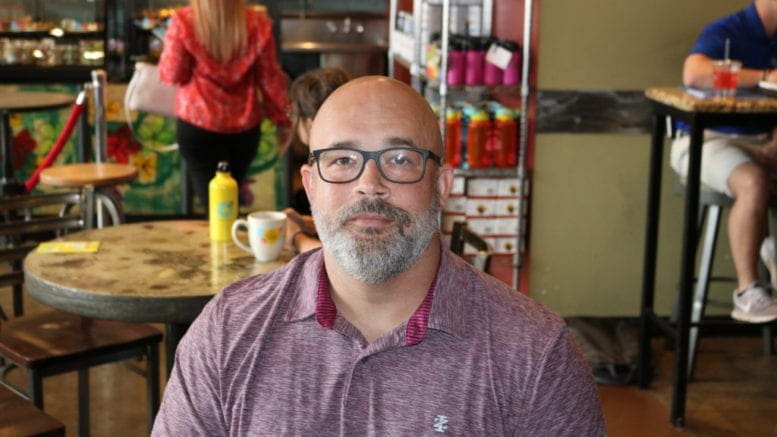In an interview at Rev Coffee Roasters in Smyrna, James “Jimmy” Herndon, candidate for Cobb County sheriff, told the Courier that the Sheriffs Office should make a complete budget publicly available.
Herndon is running as a Democrat. If he wins the primary, which will be held May 19, 2020, he will face incumbent Sheriff Neil Warren (assuming that Warren also wins his primary election).
Herndon also discussed the 287-G program in which Cobb deputies serve as immigration officers, his proposal that the Cobb jail return to the practice of hiring detention officers, and the problems with morale in the department.
Herndon’s background
Herndon was raised in Clinch County in south Georgia.
“It’s next to the little dip in Florida, that’s basically how I tell people. It’s halfway between Waycross and Valdosta,” Herndon said.
“I lived with my grandparents primarily growing up,” he said. “I finished high school there.”
“Then I went to Valdosta State University,” said Herndon. “I got a bachelor’s degree in Criminal Justice. Stayed on for another year, then got a Master’s Degree in Criminal Justice and then I moved up here with my then-wife to Cobb County, and got a job with the Cobb County Sheriff’s Office.”
He said that after working in the department for four or five years, he realized that by taking a few more classes he could achieve a second Master’s degree, so he got a degree in Public Administration.
“I began working for the Sheriff’s Office in January of 2002,” he said. “I worked in the jail for a short time, then got moved out to Field Operations where I worked as a regular deputy, serving warrants, civil papers, doing all that fun stuff.”
“Then it wasn’t very long after that I was made an investigator with the Fugitive Unit,” said Herndon. “That’s where you’re undercover and you just hunt for the worst: murderers, rape, armed robberies, high priority crimes.”
“You team up with the U.S. Marshalls when you do that,” he said. “I really enjoyed that for years and years and years until I got a boss who said ‘Hey, you’ve been here a long time. We know you like it, but you probably need to take the sergeant’s exam.'”
“So I said, ‘OK’. I had always supervised people in some capacity. I’ve been a corporal training officer. Our version of a corporal is a Deputy Sheriff 3. So that makes you a training officer. So I’ve spent the bulk of my career training people or supervising people or both,” he said.
Work in the Fraud Unit
“I had kids now, and the hours are crazy, getting called out day and night because you have to move when the bad guys move when you’re in the Fugitive Unit. So I had to go to the Fraud Unit and began working white collar crime and handled some really big cases there,” he said.
“I got promoted to sergeant. I remained in the fraud unit for a little while. Then I got moved back to the jail,” he said. “They tend to do that with supervisors there for some reason, even though you’ve been out on the street all the time.”
“So I went to the jail about three months, and then they promoted me to Crime Scene Unit supervisor, and I took over the Crime Scene Unit. I took over the Records Division. And then I was also reassigned (to) Field Operations, and supervised the south end of the county for warrant services … I had to do all three of those combined,” said Herndon.
Moving to the private sector
He said, “That became really stressful, really wearing me out, and I was like ‘I could probably go to the private sector and do better with this.'”
“And I’d been thinking about running for sheriff one day. I made the mistake of letting that out in the sheriff’s office. That’s not good to ever do,” he said.
“So I went to the private sector. I could take the skill-set that I’d acquired over all those years, and get paid fairly well,” he said.
“I left in September of 2017 and I’ve been doing basically private investigator/security type work ever since,” he said.
The Sheriff’s Office Budget
“Myself and others have tried to get a copy of the budget for the Sheriffs Office, how much was took in and how much was spent, and what do you spend it on,” he said.
“I worked there. I was the records supervisor, and there’s $85 million. They get more money than any other department in this county. Now the bulk of that goes to inmate health care, allegedly, but we don’t know, because they won’t let us see the bills,” he said.
“Once the sheriff’s got (the money) he can shift it around wherever he feels like.”
Referring to Louis Hunter, Herndon said. “The man used to be a lobbyist. Sheriff Warren hired him and gave him the made-up position of Director of Legislative Affairs.”
“I have no idea what a sheriff should be legislating because they’re law enforcers, not law makers. If you’re trying to make law you’re in the wrong business. That’s not what you do,” he said.
“If someone wants to go down that road, I’d encourage them to run for Congress,” said Herndon. “Those people make law, the Sheriff’s supposed to enforce them. But he had that lobbyist in there, $75,000 a year, brand new, a Tahoe that he gets to take home back and forth like a law enforcement officer. That just seems wasteful.”
“I looked into his education and background and I don’t see anything meriting $90,000 a year,” he said.
“I think the budget should be published,” he said. “Whatever your budget is you should publish it. So if I go out and I buy 10 AR-15s or something for the department, I need to explain why … Every purchase … needs to have a justification: a cost, how long you expect it to last, who’s going to use it. When you don’t do those things, it gets real shady.”
“So in that particular thing it’s in the benefit of the county for the Sheriff’s Office to hire an accountant,” he said. “The Sheriff’s Office handles a tremendous amount of money. It’s not just the $85 million budget. They handle all the bond money. So every time you hear someone paying a $10,000 bond or whatever, a bondsman got that 10 grand and pulled it out of his account and transferred to the sheriff’s account.”
The 287-G Program
“(Warren) gets a lot of praise from certain groups in our community for the 287-G program … and he gets negative comments as well. I don’t think a lot of people understand exactly how it works. Both sides of this argument are guilty of presenting the little bright and shiny parts of the way they say it works or doesn’t work,” he said.
“I didn’t work directly for the ICE program but I worked there at the jail, and as a supervisor in the jail,” said Herndon.
“Everyone that comes in that appears to be a foreigner they ask them where they’re from. These are Fifth Amendment rights (against self-incrimination) and if (the inmate) didn’t say ‘I’m from Mexico’, they probably wouldn’t be detained over there by the ICE deputy and have a hold put on them,” he said.
Herndon said that he doesn’t approve of tearing families apart. He said that the argument is that the person should not have come here to begin with.
“But if they are fleeing a place where they are dying, I don’t think many people would blame them for that,” he said.
“The problem is, as you probably know, when you take a parent away from a child that’s here legally, you’ve just made that child an orphan,” he said. “That child can’t go to Mexico, it can’t go anywhere back with the parent, you’ve made that child an orphan and now it’s put in foster care.”
“I’ve notice that never really gets covered. That bothers me,” he said.
“But my biggest stickup with the 287-G program is the massive amount of money it costs,” he said. “On average, if you look at the stats, ICE only pays about 12 percent of the costs of the departments that run this program. So that puts local taxpayers on the hook for all the salaries, benefits packages, everything for those deputies.”
He said, “They’re not allowed to work any other areas. They are chained to ICE. They only work ICE cases. So if we’re short-handed in the psychiatric unit or somewhere where we’re having deaths and people dying, we can’t pull those deputies over there because they’re stuck to this program.”
“And it also doesn’t take into account that they on average, the last numbers I got from the Sheriff’s Office … they don’t want to release any of this information … it’s about $75 dollars per day per inmate. If he’s detaining the numbers he says he is it’s costing us quite a bit of money, although he won’t tell how much money it’s actually costing,” said Herndon.
He said questions about the cost sent him in a loop. The Sheriff’s Office told him to ask ICE, he said.
“ICE ping-pongs it back and says ‘We don’t keep those numbers, that’s the local Sheriff that does’,” he said.
“But one of the biggest things I have from a criminal justice standpoint, just looking at the Constitution if we’re getting into that, every other person, no matter where they’re from, for any crime, when they are taken to jail, a warrant, citation or court order puts them there,” he said. “All three of those things have judicial review. Even if I take you to jail on a ticket, I still have to take that ticket within four hours here in Cobb County, and go to a magistrate and explain to him why I decided to take you to jail, and why I decided to keep you there.”
“If I don’t satisfactorily answer those questions, and prove you are in fact the right person on this, then he’ll order me to let you go,” said Herndon. “That happens from time to time.”
“With ICE there’s no judicial review,” he said “None. So if I’m an immigration officer and I just go ‘That guy’s probably the same Jose Rodriguez’, I put a hold on him, and he just sits there.”
“I posted (on Facebook) about a case out of Louisiana the other day where a U.S. citizen was detained in their jail for four extra days. People are like ‘oh, that’s four extra days,’ That’s four extra days of him not working, losing his job, you can’t give a man his freedom back,” he said.
“And they put an ICE hold on him,” he said.
He said in most circumstances a judge makes the determination whether to hold the person.
“That’s what we pay those people to do. With this immigration thing we’re asking local officials to take short cuts. We’ll skip the Fourth Amendment to the Constitution, and let’s just put holds on these people. And that gentleman in Louisiana, the sheriff said they put a hold on anybody that’s Latino,” he said.
“That’s ugly,” he said. And (local sheriffs) don’t have any immunity to that. So guess who’s on the hook for that lawsuit? The local taxpayers.”
“The federal government steps aside (and says) ‘We gave him the powers, he has the responsibility’.”
“I don’t like it,” Herndon said. If you want to keep someone in jail, it’s simple. You take a warrant out on them. If you’re alleging that they crossed the border illegally, which you hear everybody hootin’ and hollerin’ is a crime, take a criminal charge on them. And that would be the answer to the warrant to hold them.”
Herndon said that numbers aren’t released on how many people are detained by ICE who turn out to not be the person being sought for a crime.
He said the people being detained are not from a population who are going to speak out.
“They’re not going to say ‘I was bullied’ they’re not going to say ‘I was mistreated.’ They’re just happy to get out of there and go on about their lives,” he said.
Low morale in the department
Herndon said that morale is low in the department, and that deputies are told not to speak up.
“They leave at the same rate, if not more, than the police department,” he said. “It’s just that the deputies are forbidden by the sheriff to speak and such.”
“So the Chief of Police (of the Cobb County Police Department) says (it’s a) First Amendment right, you can show up in these meetings, you can wear your uniform, behave yourself, don’t say anything that’s not true, that kind of thing,” he said.
“That’s good,” Herndon said. “If people don’t feel empowered and don’t feel like you care and are taking care of them, they’re going to leave. The majority of the people I’ve seen leave the Sheriff’s Office over the years that I’ve worked there, they did not leave to take a higher paying job. They left to take a lower paying job in a different department where they felt they were treated better.”
“I’ve seen people go to Cherokee, Paulding, and they pay substantially less. But they’re as happy as they can be over there,” he said.
He said that deputies are told when they are assigned to the jail, that they will soon be put on the road.
“That’s not the case,” he said. “I talked to a guy the other day, he’s got more than ten years out there in the jail. They don’t let them go. They’re too short of bodies, and they never intend to let them go. So they lie to them and tell them they’re going to keep them here for a short period of time, and move them out, when it’s not possible.”
“I looked at rosters from the early nineties and late eighties,” he said. “We had double and triple the number of deputies out here on the street that we do now. The Sheriff’s Office is just shrinking into itself, and doing less and less and less.”
“There are only certain things that (the Sheriff’s Office) has to do,” he said, “and it’s turning into a bare minimum thing, which I don’t think helps people.”
Detention officers
“They used to have detention officers,” he said. “And they ended the detention officer program early on in my career there, and I don’t know why. It seemed to work fine.”
“They only worked the jail,” he said. “You don’t have to buy them guns, you don’t have to buy them cars, bullets, all that training, all that crazy stuff, and send them through a ten-week police academy, two week jail school, and pay them a much higher rate because they have to know how to do all these things.”
He said that detention officers had been required to take a two-week course, then they could work in the jail after another six to eight weeks of training.
“And they generally carry pepper-spray and handcuffs. All that gear (that deputies wear) is a lot of money,” he said.
He said that the deputies who currently work the jail don’t wear the guns and other expensive equipment while they are working the jail, even though the department has to provide them. So equipping detention officers would be much less expensive, Herndon said.
“You’re wearing the exact same thing as the detention officers. For a time there, we were all serving side-by-side until they phased them into deputies,” he said. “I don’t know if it was just more money allocated to them or a bigger chunk of the pie kind of thing, or what. But it doesn’t make sense. I don’t care if the budget is $85 million or $60 million, if I can get it done for 60 let’s get it done for 60.”
“And plus, people would in the end be happier because they signed up being a detention officer,” he said. “There was no ‘I’m going to get out there one day, and this could be my day today, they could move me out’.”
“There’s literally kids, younger guys, they’re just waiting when they hear a round of moves are going to come, they’re going to move people out of the jail, they’re just sitting there like they’ve got lottery tickets, and then they don’t,” said Herndon.
“They go through that a couple of times, and give up hope, and they go somewhere else,” he said.
Herndon said that with the money saved by hiring detention officers to the jail, more staff could be hired.
“It’s dangerous the way it is now, to have two men watching over 400 people by themselves,” he said.
He said the salary for a detention officer was usually about $10,000 less than that for a deputy.
He said with the savings, more deputies could be hired for duties that require carrying a gun.
Deputies working the jail are overwhelmed, he said, particularly in duties like suicide watch, which requires them to check in on the inmate every 15 minutes.
“Well, if you’re in the infirmary and the nurse wants to go in the cell and you’re having to defend her and protect her, you might miss your rounds,” he said.
Deaths while in custody
Three inmates have died in custody in the Cobb County jail recently, and Herndon said all inmate deaths should be investigated by the GBI. He also said that reforms should be made to the way the jail handles suicide watch.
“The other thing I’d like to stress is if someone dies in the jail, and I’m sheriff, I’m not investigating it,” he said. “Nobody wants you to investigate yourself and how you did nothing wrong.”
He said he would even apply that rule to deaths that might seem obvious.
“It’s not what the public wants to hear,” he said. “We have another state agency that we pay to do these things. They’ll help us do it at the drop of a hat. That’s the GBI.”
“You call them in, they don’t know anybody there, they’re good, they’re highly educated, I had a lot of classes training with these guys,” he said. “They’re all crime-scene certified, and they’re investigators. They come in there, they do the scene, they write it up, impartially, and they go ‘This is what happened.'”
He said he thinks that officer-involved shootings and deaths in custody should always be investigated by the GBI.
Herndon mentioned the case of Reginald Wilson, a man under treatment for schizophrenia, who died in custody. He was one of three inmates to die in Cobb County custody at the detention center recently.
Herndon said, “There was a guy, in custody, he was in the padded room, it has no toilet, no running water. His cause of death, he died of dehydration. How?”
“Because the problem is, when you incarcerate any man, woman or child, when they go behind those walls they are 100 percent dependent on you. They can’t go to the bathroom without you. They can’t get a pair of socks without you. They can’t eat without you. They have access to nothing. So if you take all these things away and then you just neglect them they’re gonna go,” said Herndon.
He said that if elected sheriff, he would also make changes in the way suicide watch is handled.
“The setup is really bad, the way that they treat people,” he said. “If anyone has ever been through the process at the jail of being on suicide watch, they will never willingly tell you again that they feel suicidal. They’d rather just go do it.”
He said an inmate who expresses suicidal thoughts is take by two to three deputies to an infirmary without being told where they are going.
They say, “Hey, you’re going on suicide watch.’ And they’re usually, ‘Oh, no, I’m fine, I was just telling you honestly how I felt.’ They take all their clothes from them. If they won’t give them up willingly they take them from them forcibly. I’m talking about underwear, socks. They’re naked as the day they were born,” Herndon said.
“Then they hand them this smock thing that’s made out of like seatbelt type material that’s quilted. Like the heaviest thing you’ve ever seen. And then they get to lay on a mattress on the floor, usually with five, six, eight other men in there,” he said.
“They don’t have soap, they don’t have toothbrushes they don’t have anything. Even when they get their food they have to eat it with their hands.” said Herndon.
He said that after two or three days of that treatment, when the evaluation is done by a psychologist, most inmates just tell the evaluator that everything is fine in order to avoid suicide watch.
For more information
For more information on Herndon’s campaign and platform, and to view his Sheriff’s Office employee evaluations, which he has posted online, visit the his campaign website, or his campaign Facebook page.





